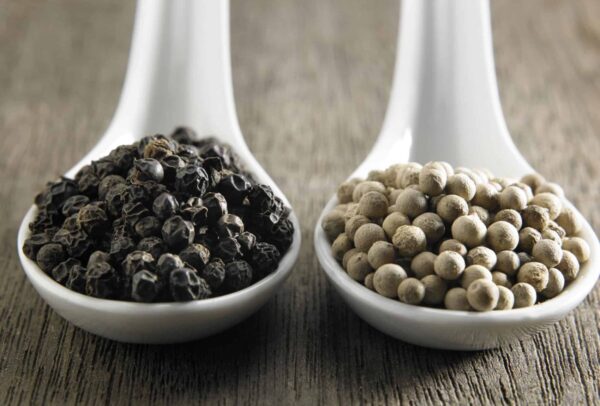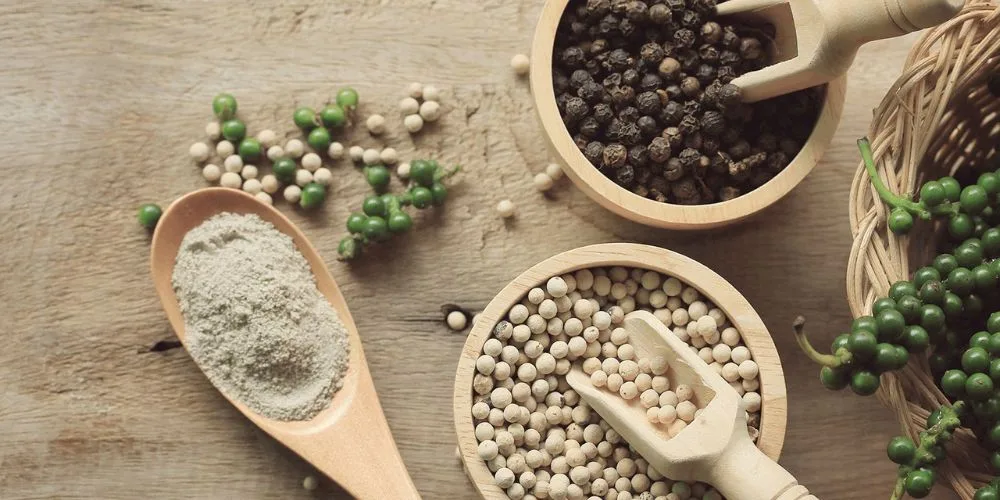When it comes to spices, few are as popular as black pepper and white pepper. For decades, these two aromatic condiments have adorned our culinary attempts, bringing depth, taste, and, of course, heat to our food. But have you ever wondered what distinguishes white pepper from its more frequent counterpart, black pepper? In this white pepper vs. black pepper comparison, we will look at their origins, processing methods, flavor profiles, heat levels, and culinary applications to see which of these spices truly merits the title of hottest.
Table of Contents
ToggleThe Origins and Processing
Black Pepper, also known as the “King of Spices,” has a long history going back thousands of years. It developed in India’s Malabar Coast, which is well-known for its spice trade. Piper nigrum, or black pepper plant, yields tiny berries that, when dried, create the peppercorns we all know and love.
Black pepper is processed by plucking the green, undeveloped berries off the plant and letting them to ferment and dry in the sun. This is the technique that gives black pepper its wrinkled appearance and powerful, fiery flavor.
Black Pepper
White pepper, on the other hand, is not a distinct species but rather black pepper that has been processed differently. White pepper is produced from completely ripened pepper berries. The outer layer of these berries is softened by soaking them in water for several days. Enzymes break down the cell walls during this soaking process, and the outer layer is removed, leaving the interior seed, which is then dried. As a result, a smooth, pale white peppercorn with a milder flavor than black pepper is produced.
White pepper vs. black pepper, while both originating from the same plant, diverge in their processing methods and flavor profiles.
Flavor Profile
Black pepper is well-known for its powerful and spicy flavor. It has earthy, spicy, and slightly fruity overtones in its flavor profile. Piperine and other substances found in the peppercorn’s outer layer contribute to its characteristic spiciness.
Black Pepper
White pepper, while derived from the same plant, has a distinct flavor. It is less spicy and gentler than black pepper. White pepper has a slightly flowery aroma and a cleaner taste, making it suitable for meals that require pepper flavor but not the visual presence of black specks.
In the culinary world, the choice between white pepper vs. black pepper often comes down to balancing heat and flavor while considering the visual impact on the final dish. Heat Level
The contrast between white pepper vs. black pepper is unmistakable when it comes to spiciness.

Black pepper
Black pepper is without a doubt hotter than white pepper. The piperine in black pepper is responsible for its heat, which can range from slightly spicy to tongue-tingling depending on the peppercorn variety and provenance. This spiciness is responsible for black pepper’s reputation as one of the hottest spices.
White Pepper
White pepper, while still peppery, has a softer heat than black pepper. Because of the soaking and removal of the outer layer during processing, white pepper is a preferable choice if you want a subtle heat that will not overwhelm your palate.
Culinary Uses
Many recipes around the world use black pepper as a seasoning. Its strong flavor and fire make it an adaptable seasoning. It is used in soups, stews, pasta, grilled meats, and just much every other savory cuisine you can think of. Freshly ground black pepper enhances the flavor and complexity of dishes, making it a cupboard must-have.
White pepper, with its lower spice and clear flavor, is frequently used in meals where the black particles of black pepper could be distracting. It is popular in white sauces, cream-based soups, mashed potatoes, and other recipes that call for a delicate peppery flavor without the extreme spiciness.
In the culinary world, the choice between white pepper vs. black pepper often boils down to the desired level of spiciness and visual aesthetics in a dish.
Conclusion
The choice between black pepper and white pepper in Kerala ultimately depends on your culinary preferences and the specific dish you’re preparing. When it comes to spiciness and versatility, black pepper, especially in Kerala, takes the lead, imparting depth and heat to a wide array of savory dishes. Conversely, white pepper boasts a milder flavor and a cleaner appearance, making it the preferred choice for certain recipes where subtlety is paramount.
Whether you lean toward the robust kick of black pepper or the understated warmth of white pepper in Kerala, one thing is certain: both these spices play a crucial role in enhancing the flavors of your favorite foods. So, the next time you reach for your pepper grinder, consider the distinctions between black and white pepper, and let your culinary creativity flourish.
If you’re looking to elevate your cooking with high-quality black or white pepper sourced from Kerala’s splendid spice gardens, explore the offerings of organic spice providers in this region. Kerala is renowned for producing some of the world’s finest spices, thanks to its ideal climate and fertile soil.
Online spice merchants offer convenient access to a diverse range of spices, including white pepper and black pepper in Kerala. This makes it effortless to introduce these mild yet flavorful spices into your culinary repertoire, enhancing your recipes with their unique charm.


